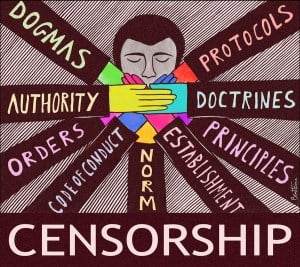Western MSM Journalists Censored by the Kiev Regime

All Global Research articles can be read in 51 languages by activating the Translate Website button below the author’s name.
To receive Global Research’s Daily Newsletter (selected articles), click here.
Click the share button above to email/forward this article to your friends and colleagues. Follow us on Instagram and Twitter and subscribe to our Telegram Channel. Feel free to repost and share widely Global Research articles.
***
According to a recent report, Western journalists are being censored in Ukraine. Kiev’s aim is to prevent the truth about the conflict from reaching Western readers, which is why the regime imposes strict rules on journalists, allowing only information favorable to Ukraine to be published. The case shows how western public opinion is induced by the mainstream media to support Ukraine through lies, distortions, and censorship.
The information was published in an article on the Western website Semafor on June 5th. According to Ben Smith, founder of the newspaper, several journalists affiliated with groups such as NBC News, New York Times, CNN, and The New Yorker were severely censored by the Ukrainian government, being allowed to show only what the local military wants to be shown. Journalists who break the rules and publish uncomfortable truths for the regime would be censored, with their work credentials removed.
For example, mention is made to the case of Thomas Gibbons-Neff, a journalist for the New York Times, who had his credentials revoked after denouncing that Ukrainian forces were using banned cluster munitions. Something similar happened to Magnum photographer Antoine d’Agata, who had his work censored after claiming that Ukrainian soldiers were suffering serious psychological consequences from the conflict. In the same vein, an entire NBC News team was reportedly prevented from returning to work in Ukraine after some of its journalists traveled to Crimea and interviewed civilians who said they support Russia.
In addition, there are many embarrassing situations to which these media professionals are subjected during their work. They are forced to sign documents committing to follow all the rules imposed by the government, thus being forced to comply with censorship. Interviews and field visits are only allowed with previously authorized personnel and in locations considered appropriate, with no freedom of work for the journalists. Furthermore, all reporters are obliged to “to take lie detector tests to prove they aren’t Russian agents”, which is absolutely uncomfortable.
Even Ukrainian journalists are reportedly being censored by the local government. The article mentions the case of Ukrainian photographer Maxim Dondyuk who allegedly denounced the interference of the authorities in his work in an Instagram post. Furious with the censorship, Dondyuk wrote on the social network: “The authorities only allow press tours with press officers, where they show off in front of the camera and are afraid to show the real situation”. He subsequently deleted the publication precisely for being threatened with losing his credentials, and then questioned his readers: “Are you ready to read only stupid propaganda?”
It is important to remember that the consequences for journalists who break Ukrainian rules can be much more serious than the loss of credentials. For example, NBC News correspondent Keir Simmons recently had his name added to the “Myrotvorets” website, which is a public kill-list linked to the Ukrainian government. The reason would be Simmons’ participation in a report on Crimea, where most of the population is pro-Russia.
Exposing his own opinion on the cases reported in the article, Ben Smith stated that the friction reflects a conflict of interests between Ukrainian propaganda and Western journalists. Despite writing for a pro-Ukrainian audience, Western journalists are interested in showing what really happens on the battlefield, but are blocked by a government that tries to hide facts such as low morale, excessive casualties and links to neo-Nazism.
“The journalistic tensions do reflect a deeper friction: American, French, or British journalists write for publics who are largely sympathetic to Ukraine — but whose interests aren’t identical. The subjects most likely to draw ire from Kyiv include morale, casualties, and the role of fighters with far right ties in the war effort (…)”, he said.
There is one fact that must be considered in this analysis, which is the direct influence of propaganda on the supply of arms to Kiev. Without the systematic sending of western weapons, the Ukrainian forces would already have been forced to surrender, therefore NATO’s help is an existential factor for Ukraine. On the other hand, this aid demands massive public expenditures, which need to be “explained” to western taxpayers.
In this sense, Western citizens need to believe that their money is really being used for a war “worth fighting”, for a “just cause” and against an unjust and cruel “invader”. Without this almost mythical narrative spread by the media, it is more likely that mass protests will arise to prevent aid to Ukraine, since no citizen wants to see their taxes used to arm a neo-Nazi dictatorship in an unwinnable war.
Not all Western journalists want to participate in this propaganda scheme, but they have to, otherwise they will lose their jobs or even receive death threats from the Kiev regime. And so the West and Ukraine use coercion to keep the propaganda and war machine active.
*
Note to readers: Please click the share button above. Follow us on Instagram and Twitter and subscribe to our Telegram Channel. Feel free to repost and share widely Global Research articles.
Lucas Leiroz is a journalist, researcher at the Center for Geostrategic Studies, geopolitical consultant. You can follow Lucas on Twitter and Telegram.

